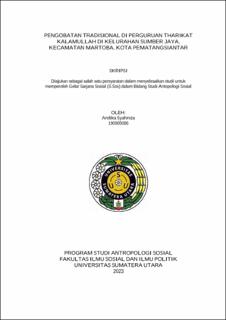| dc.description.abstract | This paper examines the anticipation of oil palm farmers facing climate changes in Silomlom Village, Simpang Empat District, Asahan Regency. The focus of this study looks at the intentions that direct farmers' actions to deal with current problems and how farmers consider what is likely to happen in the future and make expectations to achieve goals. Emicly, each farmer has a way of anticipating in dealing with problems in oil palm farmland. My interest in this title is because the problems of oil palm farmers in this village are very complex and intersect with each other; Starting from diseases, pests, price fluctuations, weather and others. In addition, farmers anticipate a variety of problems faced.
This research uses qualitative methods with fieldwork. Introduction I did research in several stages with a total time of one month, during the mini ethnographic work of the Agricultural Anthropology course. The process of collecting data and writing a thesis takes six months. Data collection techniques in the form of in-depth interviews and observations are involved, which are outlined in field notes and data analyzed in a continuous analysis manner. The key informants in this study were oil palm farmers who were categorized based on their ability to provide detailed and in-depth explanations of how they planted, cared for, harvested, and overcame problems with oil palm trees. Thus, folk taxonomy analysis is also used in this study to see how farmers formulate threats from problems and imagine and design anticipatory plans for problems.
The results of this study show that there are variations in anticipation made by farmers in facing various problems in oil palm planting practices related to five climate problems and also five other problems that are not related to climate. Farmers rely on knowledge gained from experience during oil palm cultivation, observations and questions and answers conducted with other farmers, knowledge from formal schools and the internet. Experiment after experiment they do from this variety of knowledge for a series of problems at hand. The experiment was part of a preventative anticipation so that the next crop would not experience the same problem. Farmers continue to do trial and error, because farmers have a very strong ambition to be free from weather problems that are difficult to predict, namely: the track season is getting longer and the fruit maturity is getting longer, the intensity of comes attacks is getting higher and difficult to eradicate, the horn beetle population increases and attacks young shoots of oil palm plants, potential floods and rat pests, and fire.
This study concludes that the anticipation carried out by farmers has not been able to overcome their problems thoroughly. Anticipation is only preventive. Prevention that is carried out also has the possibility of not succeeding. This is due to limited knowledge of farmers. Farmers still survive with knowledge of oil palm cultivation, one of which is obtained from generation to generation. Even though the natural conditions at this time are not what they used to be and farmers have never experienced conditions like this. | en_US |


